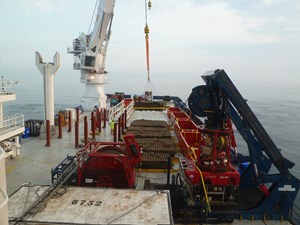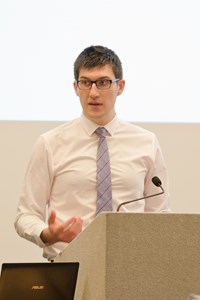Jee presents subsea mattress removal research in Aberdeen
ABERDEEN, United Kingdom -- Jee Ltd, an independent multi-discipline subsea engineering and training firm, has completed a contract with Decom North Sea (DNS), the representative body for the decommissioning industry, to identify pioneering methods of salvage and re-use options for concrete subsea mattresses.
The aim of the project, which commenced in February 2015 and saw Jee Ltd partner with DNS and Zero Waste Scotland (ZWS), was to identify innovative new solutions for subsea mattress removal, which would work without diver interventions during the lift procedure, resulting in improved safety and reduced costs.
“This project was implemented in direct response to our operator member requests and Jee’s findings have been eagerly anticipated. Mattress removal can add significant costs to decommissioning projects, hence we are keen to establish a variety of solutions to further drive efficiency,” Nigel Jenkins, chief executive of DNS, said.
Adam Smith, a subsea engineer at Jee Ltd, presented the findings at an event hosted jointly by DNS and ZWS at the Aberdeen Exhibition & Conference Centre Thursday. Around 100 oil and gas professionals came together to discuss the key findings of the report and how they will improve industry best practice and the circular economy.
“The significant cost of removing and disposing of aged subsea mattresses is an issue affecting the industry globally. Identifying innovative new methods to support the decommissioning sector is high on the industry’s agenda, and DNS’s highly-attended event is the ideal platform to showcase the results from the project,” Smith said.
“Our research played a key role in this project, which will form a basis for economic and environmental assessment of mattress conditions and the options for removal and re-use going forward. We also helped to identify the criteria required to determine whether subsea mattresses should be removed or left in situ, the main consideration being the safety of the subsea divers and the environmental impact,” Smith added.
Jee developed a number of innovative suggestions for the re-use of the mattress concrete including tidal lagoons structures, the construction of artificial reefs to encourage new sea life and to lay road foundations, resulting in less new concrete needed to be produced and as a result, reduced carbon dioxide emissions.
“This joint report has some fascinating insights about how we go about extending the useful life of subsea concrete mattresses. I am sure it will be of great interest to all those in the oil and gas industry and beyond. The findings point to some exciting cross-over potential with other sectors, such as offshore renewables. Circular economy practices present a terrific economic opportunity for Scotland and we can best realize this by collaborating across sectors and industries,” Iain Gulland, chief executive of Zero Waste Scotland, said.




